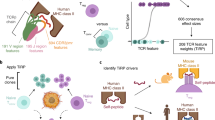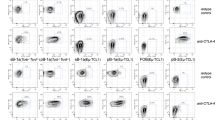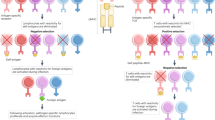Abstract
The major histocompatibility complex (MHC)-linked immune response (Ir) genes confer high responsiveness on some MHC haplotypes and low or no responsiveness to certain antigens on other haplotypes (for review see ref. 1). The cause of nonresponsiveness is thought to be a failure of T cells to be stimulated by a given combination of antigen and MHC molecules, which can, in principle, arise in two ways: either the antigen-presenting cells (APCs or macrophages) of the nonresponder haplotypes are incapable of presenting the foreign antigen to T cells in an immunogenic form2,3 or the T-cell repertoire of nonresponder haplotypes lacks clones recognizing the antigen in the context of a given MHC4. We have recently shown that APCs from nonresponder strains can in fact present antigen to allogeneic responder T cells, depleted of alloreactivity against the APCs themselves5, which indicates that the mechanism of nonresponsiveness is not a failure of APC function. Using the same experimental system, we show here that responses of T cells to antigen presented on allogeneic APCs do not depend on the Ir phenotype of either the T cell or the APC: Ir gene control is completely absent from these responses. The results strongly suggest that Ir gene-controlled nonresponsiveness is associated with the adjustment of the T-cell repertoire to self-MHC antigens.
This is a preview of subscription content, access via your institution
Access options
Subscribe to this journal
Receive 51 print issues and online access
$199.00 per year
only $3.90 per issue
Buy this article
- Purchase on Springer Link
- Instant access to full article PDF
Prices may be subject to local taxes which are calculated during checkout
Similar content being viewed by others
References
Krco, C. J. & David, C. S. Crit. Rev. Immun. 1, 211–257 (1981).
Rosenthal, A. S. Immun. Rev. 40, 136–152 (1978).
Benacerraf, B. J. Immun. 120, 1809–1812 (1978).
von Boehmer, H., Haas, W. & Jerne, N. K. Proc. natn. Acad. Sci. U.S.A. 75, 2439–2442 (1978).
Ishii, N., Baxevanis, C. N., Nagy, Z. A. & Klein, J. J. exp. Med. 154, 978–982 (1981).
Thomas, D. W. & Shevach, E. M. Proc. natn. Acad. Sci. U.S.A. 74, 2104–2108 (1977).
Baxevanis, C. N., Wernet, D., Nagy, Z. A., Maurer, P. H. & Klein, J. Immunogenetics 11, 617–628 (1980).
Shevach, E. M., Green, I. & Paul, W. E. J. exp. Med. 139, 679–695 (1974).
Kindred, B. & Shreffler, D. C. J. Immun. 109, 940–943 (1972).
Zinkernagel, R. M. & Doherty, P. C. Nature 248, 701–702 (1974).
Shearer, G. M., Rehn, T. G. & Garbarino, C. A. J. exp. Med. 141, 1348–1364 (1975).
Bevan, M. J. J. exp. Med. 142, 1349–1364 (1975).
Sprent, J. J. exp. Med. 147, 1159–1174 (1978).
Schwartz, R. H. Scand. J. Immun. 7, 3–10 (1978).
Author information
Authors and Affiliations
Rights and permissions
About this article
Cite this article
Ishii, N., Nagy, Z. & Klein, J. Absence of Ir gene control of T cells recognizing foreign antigen in the context of allogeneic MHC molecules. Nature 295, 531–533 (1982). https://doi.org/10.1038/295531a0
Received:
Accepted:
Issue Date:
DOI: https://doi.org/10.1038/295531a0
This article is cited by
-
Mechanisms of genetic control of immune responses
Immunogenetics (1984)
-
Internal images of antigens within the immune network
Survey of Immunologic Research (1983)
Comments
By submitting a comment you agree to abide by our Terms and Community Guidelines. If you find something abusive or that does not comply with our terms or guidelines please flag it as inappropriate.



